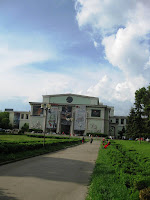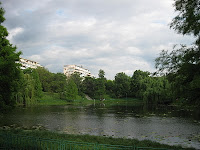
At the last moment of Friday, I was informed that next Monday would be a holiday at the Embassy. It also would most likely be one of the days on which the Romanian Government workers all around the country would go on strike to protest the pension and salary cuts imposed by the government. Given this extra time, I decided to make good on my ambitions to go see other parts of Romania and the surrounding area. For this weekend I booked a train ticket and an overnight at a hotel in Constanta, Romania’s main coastal city. After a sightseeing excursion, and an enjoyable evening with students from Texas A & M University, I set out the next morning for the Black Sea.
It took four hours on a train to reach Constanta. Upon arrival I wondered if I was in the right place, as the platform consisted of little more than a few weeds. However, I quickly found my way to the city streets. At that point I was faced with the question of how to find my hotel. The tour book gave some limited information on how to take the bus. But local sources on how to do so, such as maps were practically non-existent (See previous post: “just knowing”). It took a full hour but I finally found my hotel, which was located about halfway between central Constanta, and Mamia, the resort town to the north. I also learned a great deal about Constanta’s bus system in the process. I left by belongings in the hotel and set off to explore the city center.
After another, much more civilized bus ride. I arrived, and having not eaten since breakfast, looked for a place to eat. I found a cheap, but good restraint in the old town. There are a few interesting things in central Constanta. First, the city was originally inhabited by the Romans, and a great deal of roman ruins survive to this day. These include a rather large mosaic floor, and the remains of the baths, which are apparently now mostly used by mother dogs nursing their puppies. Getting to see these ruins can be a bit problematic, as in another hold over from the communist days doing so requires arguing with babuszka at to gain admittance at the entrance. The Famous museum of Archeology is evident on the main square. The old town is also the Seat of Islam in Romania. the Seat of the Romanian Matufi, or Muslim spiritual head rests in a rather large Mosque on the southern end of the main square, which competes for attention with the orthodox cathedral right next to it.
There was a wedding going on at the orthodox cathedral, and I ducked into a dark corner to watch. It was a fascinating experience. After that I spent some time walking along the black sea coast, and viewing some other attractions. Upon reaching the beach I decided to climb out on a jetty for an unobstructed view of the Black Sea. The view was amazing. Unfortunately, my camera fell into the sea while I was climbing on the rocks. At least I still have my camera phone. After enjoying an ice cream with a view, I headed back to the hotel for a good night sleep.
The next day, I went sightseeing around a lake north of my hotel. It was Sunday so there were church services in progress. I attended an orthodox service in a church by the lake (above). The service was very uplifting, constantly accompanied by the chants and hymns of a live choir, some aspects of it appeared to be taken from the western tradition, while other aspects and hymns seemed practically middle-eastern. The church itself is not native to the region of Northern Dobrega, but was transported in from Martures in the extreme north of the Country I then continued up the lake, and crossed over into Mamia. After exploring the boardwalk for a time I was time to head back. I checked out of my hotel and prepared for the 4 hour train ride back to Bucharest. Upon arrival home I was tired but glad I went.















